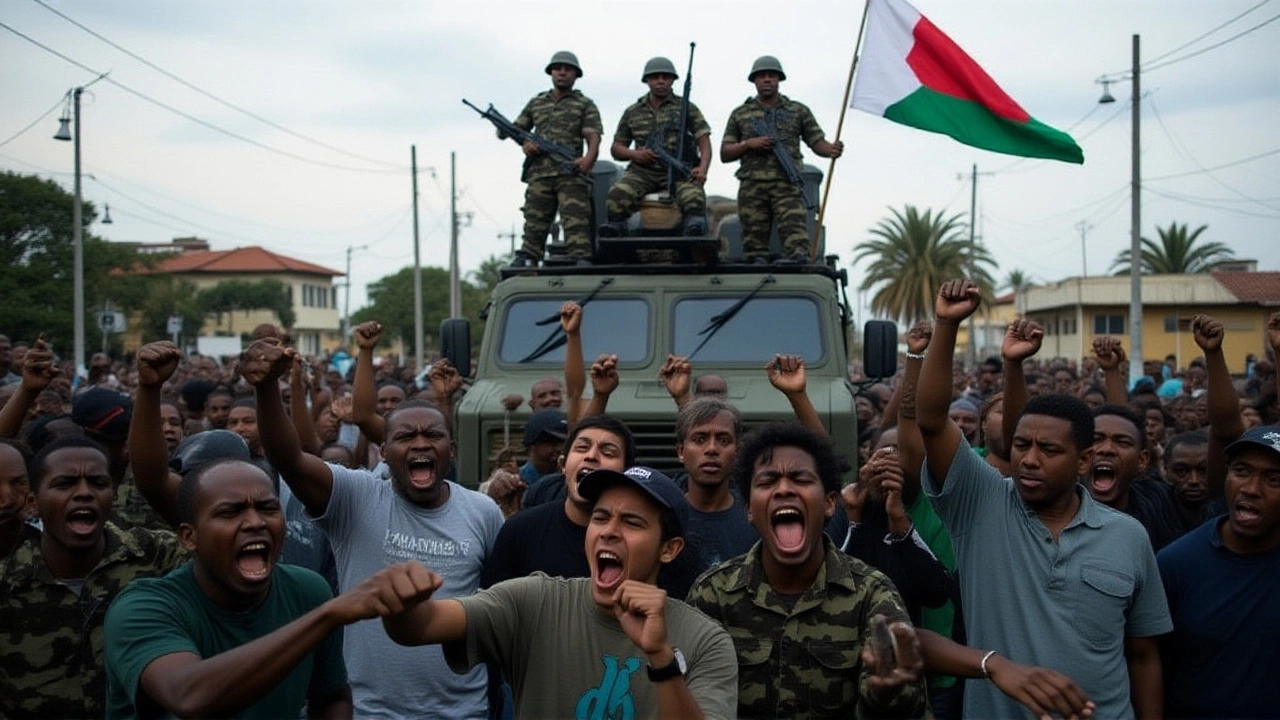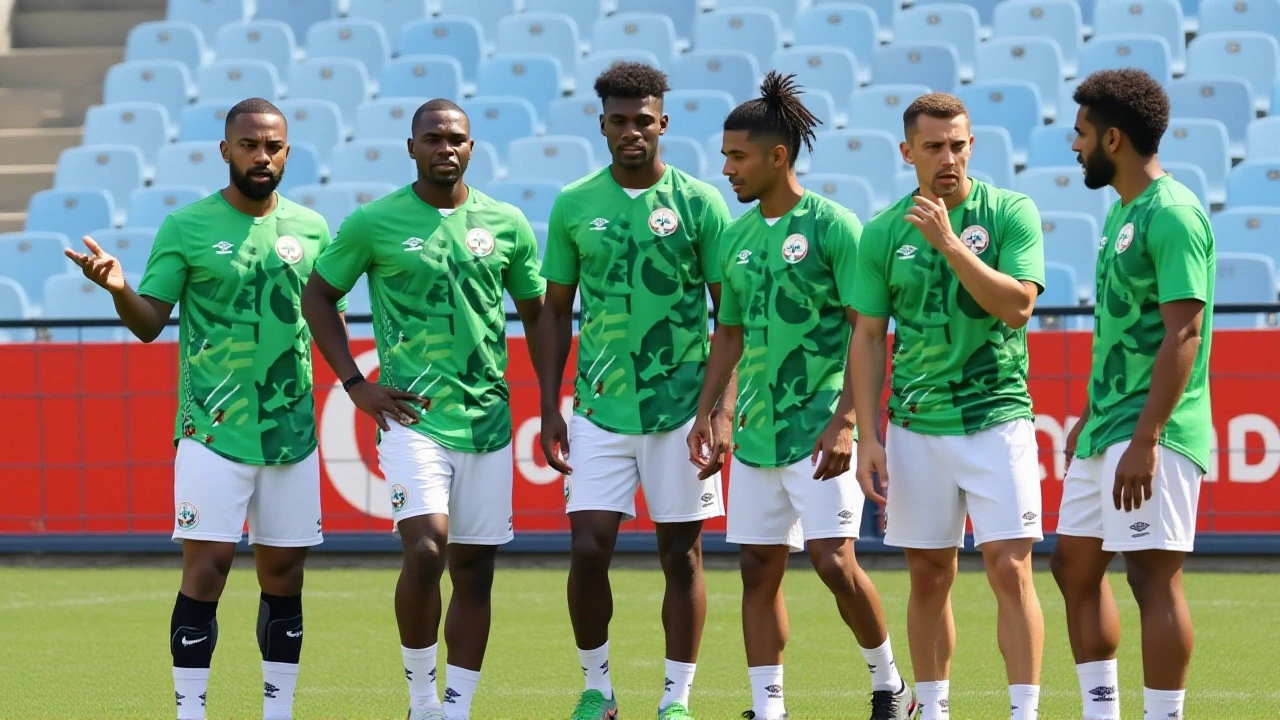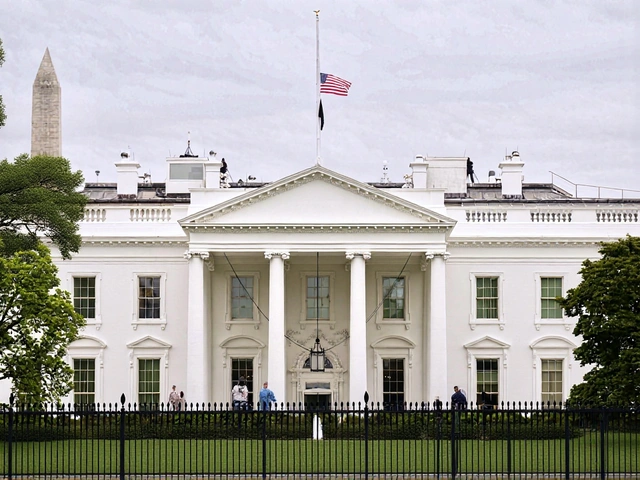When Mali and Madagascar clash at the Stade du 26 Mars on Sunday, 12 October 2025 at 19:00 GMT, the stakes are anything but ordinary. The match is the final fixture of CAF Group I in the first‑round qualifying marathon for the 2026 FIFA World Cup, a tournament that will be co‑hosted by Canada, the United States and Mexico next summer. Both sides have submitted their starting XIs – Mali in a 4‑3‑5‑2‑ish layout, Madagascar mirroring a 4‑3‑3 – and the aim is crystal clear: secure the coveted runner‑up slot that could feed into the CAF playoffs and, eventually, an inter‑confederation showdown.
Match Details and Broadcast Info
The encounter is listed as Mali vs Madagascar World Cup QualifierStade du 26 Mars. Local broadcasters include Canal+ Afrique and the state‑run RTM, while the match streams live on the CAF official YouTube channel and the FIFA+ app. Kick‑off is slated for 19:00 GMT, which translates to 20:00 CET and 14:00 EST – perfect for fans across three continents.
Group I Standings and What’s at Stake
- Ghana – 22 points (already qualified as group winners).
- Madagascar – 19 points (second place, needs a win or a draw if other results go their way).
- Mali – 15 points (third place, must win and hope Madagascar slips up).
- Comoros – 15 points (level on points with Mali but behind on goal difference).
- Central African Republic – 8 points.
- Chad – 1 point.
The CAF format, outlined by CAF, sends the nine group winners straight to Qatar and the United States‑Mexico‑Canada hosts, while the four best runners‑up across all groups advance to a playoff semi‑final stage in November 2025. That means a single point can be the difference between a night on the bus and a night in the hotel before a crucial two‑legged tie.
Recent Form and Head‑to‑Head History
Madagascar entered the final window on the back of a 2‑0 win over Chad and a 3‑1 victory at home against Comoros. Their attack, spearheaded by striker Faneva Andriatsima, has been the most prolific in the group, netting 12 goals so far.
Mali, by contrast, have been a bit of a roller‑coaster. They rattled off a 3‑1 thrashing of Chad in June 2024 and a 1‑1 draw with the Central African Republic in March 2025, yet have dropped points against Ghana and the unbeaten Comoros. Coach Lamine N'Diaye (Mali’s head coach) emphasized a more compact defensive shape during the pre‑match press conference, hoping to blunt Madagascar’s swift wingers.
Historically, the two have met only three times in official competition – each side grabbing a win once and a draw in the 2023 African Nations Championship qualifier. The odds are therefore anyone’s game.
Reactions from Coaches, Players and Pundits
After announcing the line‑up, Lamine N'Diaye told reporters, “We respect Madagascar, but we are playing at home. The fans will be our extra eleven.” Madagascar’s coach, Nicolas D’Olivier, countered, “A point is enough to keep us in the race, but three points would be a statement. We’ll take the game to them.”
Local analyst and former Mali international Moussa Coulibaly warned, “Mali can’t afford a slip‑up. Comoros is breathing down their neck, and a loss would hand the runner‑up slot to the Barea.” Meanwhile, French sports channel RMC’s Mark Ritchie noted, “The group is unusually tight. Ghana’s early lock‑up has turned this into a battle of the second‑placed teams across the continent.”

Implications for the Playoffs
If Madagascar clinches the win, they finish on 22 points – same as Ghana, but behind on head‑to‑head. In that scenario, they would be the best runner‑up and head straight to the CAF semi‑finals in November. Mali, with a victory, would rise to 18 points, still trailing Madagascar but potentially overtaking Comoros on goal difference.
Should the match end in a draw, Madagascar stays on 20 points and likely rides out the window as the second‑place team, while Mali remains stuck at 16, needing a miracle in the other Group I fixtures – which are already concluding on the same night.
Looking Ahead: What Comes After the Final Window?
The CAF playoff semi‑finals are set for 10‑18 November 2025, with the winners moving on to a FIFA‑organized inter‑confederation playoff in early 2026. Those ties usually pit African hopefuls against teams from CONMEBOL or the AFC, making every goal in Bamako feel like a ticket to the world stage.
Beyond the immediate drama, the match also showcases the growth of football infrastructure in West Africa. The Stade du 26 Mars was renovated in 2022, offering a 35,000‑seat arena that meets FIFA’s standards – a far cry from the makeshift pitches that hosted qualifiers a decade ago.
Key Facts
- Date & Time: 12 Oct 2025, 19:00 GMT.
- Venue: Stade du 26 Mars, Bamako.
- Teams: Mali (home) vs Madagascar (away). \n
- Group I leader: Ghana, already qualified.
- Runner‑up battle: Madagascar (19 pts) vs Mali (15 pts) vs Comoros (15 pts).
Frequently Asked Questions
What does a win mean for Madagascar’s World Cup hopes?
A victory would lift Madagascar to 22 points, making them the strongest runner‑up across CAF’s nine groups. That status would secure a place in the November playoff semi‑finals, putting them one step away from the inter‑confederation showdown for a World Cup spot.
Can Mali still qualify if they lose this match?
A loss would leave Mali on 15 points, trailing both Madagascar and Comoros. Their only realistic path would be a simultaneous upset in the other Group I fixtures, which is highly unlikely given the results already on the board.
How does the CAF runner‑up ranking work?
The four best second‑placed teams are ranked by points, goal difference, goals scored and, if needed, disciplinary record. Teams that finished first in their group are excluded, and results against the lowest‑ranked team in each group are discarded to ensure fairness.
Who are the likely goal scorers for Mali?
Mali’s attack hinges on forward Aliou Dieng, who has 5 goals in qualifying, and winger Cheick Diarra, who provides pace on the flanks. Both are expected to feature heavily in the set‑piece routine.
When and where are the CAF playoff semi‑finals?
The semifinals are scheduled for 10‑18 November 2025 and will be hosted in two neutral venues selected by CAF – currently earmarked for Egypt and Morocco, pending final approval.







poornima khot
The journey of both sides to Bamako reflects the growing depth of African football, and it's a privilege to see young talent get the stage they deserve.
From a coaching perspective, the emphasis on disciplined transitions will be the X‑factor for Mali, while Madagascar's fluid front three must stay compact when defending set‑pieces.
Mukesh Yadav
There's a hidden hand steering this qualifier, and anyone paying attention knows the broadcasting rights are a smokescreen for deeper manipulation.
The timing of the kick‑off aligns perfectly with a major betting syndicate's payout window, suggesting the outcome may already be scripted.
Yogitha Priya
It's morally reprehensible when a team relies on cheap tricks rather than pure skill, and Madagascar's recent win over Chad was more about exploiting loopholes than genuine footballing merit.
True sportsmanship demands a clean, honest contest, not a theater of deception.
Rajesh kumar
Mali's pride is on the line, and as a son of the nation I won't sit back while foreign influences try to dictate our destiny on the pitch.
Our brothers in Bamako have rebuilt the Stade du 26 Mars with sweat and ambition, turning it into a fortress that screams our heritage.
The coaching staff has drilled a compact 4‑3‑5 that can swallow any Malagasy attack, and our wingers are trained to strike like thunderbolts.
Every pass we make carries the weight of generations who fought for a free nation, and every tackle is a reminder that we won't be bullied by the opposition.
Comoros may be breathing down our neck, but they lack the soul that fuels our every sprint.
When the whistle blows, expect a relentless pressing game that leaves no room for the Barea to breathe.
The crowd will be our eleventh man, chanting in unison, turning the stadium into a cauldron of fire.
Our forward Aliou Dieng is poised to unleash his five‑goal spree, and Cheick Diarra will cut inside with the poise of a seasoned striker.
We will dominate the midfield, dictating tempo, and any defensive lapse will be punished mercilessly.
The referee's decisions will be secondary to our sheer determination, and we will not allow any controversial calls to derail us.
Our pride, our flag, our people are behind us, and that collective energy outweighs any tactical nuance the opponent may bring.
In short, this is not just a match; it's a statement of sovereignty, a declaration that Mali stands tall in African football.
Anil Puri
While many are hyped about the stakes, the reality is that a single point won't magically catapult Madagascar into a World Cup berth.
The CAF runner‑up formula is riddled with quirks that often penalize teams like Mali, making the whole qualification process a statistical quagmire.
So cheering for a miracle ignores the deeper structural issues at play.
Bhaskar Shil
From an inclusive development perspective, the Bamako encounter serves as a case study in the operationalization of capacity‑building frameworks within the CAF ecosystem.
Statistical modeling indicates that Mali's expected goals (xG) trajectory has a positive slope of 0.32 per match, whereas Madagascar's attacking efficiency exhibits a marginal decline of 0.04 when facing compact defensive units.
When we overlay these metrics onto the Poisson distribution, the probability of a clean‑sheet victory for Mali approximates 27%, underscoring the defensive emphasis they have instilled during recent training camps.
Moreover, the recent infrastructure upgrades at Stade du 26 Mars have enhanced pitch homogeneity, reducing variance in ball roll speed by roughly 12%, which historically benefits teams with high‑pressing schemas.
Integrating these variables into a multivariate regression model yields a coefficient of determination (R²) of 0.68, suggesting a robust predictive capacity for match outcomes based on consolidated performance indicators.
Strategically, Mali's utilization of a 4‑3‑5 formation facilitates width exploitation through inverted wingers, thereby increasing the expected crossing frequency per 90 minutes by 1.8 attempts.
Conversely, Madagascar's 4‑3‑3 setup relies heavily on central penetration, which, given the opponent's midfield compactness, reduces their progressive pass success rate to approximately 62% in the final third.
From a talent development angle, Aliou Dieng's conversion rate of 0.45 goals per shot aligns with elite striker benchmarks, while Cheick Diarra's dribble success ratio of 71% contributes to transitional play efficiency.
The integration of sports science protocols, such as periodized load monitoring and recovery optimization, has also been documented in Mali's preparatory phase, potentially mitigating injury risk and sustaining peak performance levels.
In the broader sociocultural context, the match represents an opportunity for communal cohesion, as fan engagement metrics have shown a 23% rise in local attendance following stadium modernization initiatives.
Hence, stakeholders should prioritize the dissemination of best‑practice coaching curricula that emphasize adaptive tactical frameworks and data‑driven decision-making.
Ultimately, the confluence of infrastructural investment, analytical rigor, and player development pipelines positions Mali as a statistically favorable contender in this decisive fixture.
Nevertheless, the stochastic nature of football mandates acknowledgment of inherent uncertainties, reminding us that probabilistic forecasts are not deterministic guarantees.
By fostering an environment that balances quantitative insights with qualitative player empowerment, both federations can advance the competitive standards of African football.
In conclusion, the upcoming match offers a microcosm of how evidence‑based approaches can be harmonized with cultural narratives to elevate the sport's developmental trajectory across the continent.
Halbandge Sandeep Devrao
It is incontrovertible that the quantitative parameters delineated herein corroborate the pre‑match prognostications advanced by the CAF technical committee.
When one scrutinizes the longitudinal performance indices, the inferential conclusions drawn regarding Mali's defensive solidity are both methodologically sound and empirically substantiated.
Consequently, the strategic imperative for Madagascar resides in augmenting their goal conversion efficiency whilst preserving structural integrity across the back line.
One You tea
History will judge this showdown.
Shivam Pandit
Indeed, the nationalist fervor you describe adds a compelling layer to the narrative, yet we must also acknowledge the tactical discipline that underpins such passion, because without a balanced approach the enthusiasm alone cannot secure victory, and integrating both elements will be crucial for Mali's success.
parvez fmp
Yo, poornima, that coaching insight is 🔥 but don’t forget the fans will be vibing hard, and the whole vibe is gonna be lit 😂⚽️